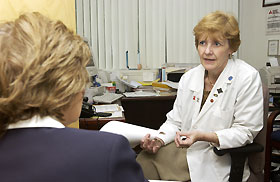For more archives, go to the Advance Archive/Search Page.
Diabetes Educator Coordinates Team Approach To The Disease
When Carolé Mensing began to focus her nursing career on diabetes education, she thought she was making a risky career move: "I thought I'd be looking for a new line of work before too long," she says.
That was more than 35 years ago.
Today, Mensing finds herself busier than ever, as coordinator of the Health Center's Diabetes Education Program during what has become a national diabetes epidemic. The incidence of the disease has grown by nearly 50 percent in the past 10 years.
 |
|
Carolé Mensing, right, diabetes educator at the Health
Center, explains her approach to diabetes care. |
She also just finished a one-year term as president for health care and education of the American Diabetes Association, the nation's leading volunteer health agency in the fight against diabetes.
"The statistics are so sad," says Mensing. "The death rate due to diabetes has increased by 30 percent since 1980, while it has fallen for other common diseases like heart disease and stroke. Diabetes kills one American every three minutes."
There are two major forms of diabetes: Type 1, also known as insulin-dependent diabetes, and Type 2, also known as medication-requir ing diabetes. Both affect the way the body uses energy from sugar, starch, and other foods. Diabetes can affect virtually the entire body and increases the risk of heart disease, kidney disease, stroke, and blindness.
The skyrocketing rise in the incidence of diabetes, especially Type 2, is attributed largely to the spread of a lifestyle with too much food and too little exercise. To help address the problem, Mensing has built a diabetes education program that relies on a team of health care professionals.
"It takes a village," says Mensing, borrowing a phrase popularized by Hillary Clinton to describe the support necessary to get people to change a lifestyle that is literally killing them.
The team consists of several physicians and nurses, a podiatrist, a dietitian, an ophthalmologist and, most recently, a health psychologist, all helping patients cope with and understand the chronic nature of the illness and its destructive effects when it is not carefully monitored and controlled.
Team members provide an extensive array of health care services. There are individual medical appointments for people recently diagnosed with diabetes so they can get one-on- one counseling about their disease and learn how to manage medications, meal planning, activity, and equipment, such as blood glucose monitors. There is case management for patients whose care requires coordinated services from several health professionals. And there are group classes for patients and their families — from the basic skills level to intermediate and advanced sessions — that focus on taking care of patients' physical and emotional needs, stress relief, goal setting, and personal care.
Recently, Mensing expanded the program to include a preventive aspect. She and dietitian Meredith Belden offer a nutrition class for individuals who need information on weight control and exercise, in an attempt to help people prevent diabetes before it starts.
The groups are all designed to help patients become actively involved with their own care. "We don't call it compliance and adherence any more," she says. "We call it empowering people to make healthy choices and changes. It's more than eating less and exercising more. People have to understand that they have choices to make about their health."
Mensing's interest in diabetes was triggered by her family history. When she was a child, her father suffered a heart attack because of uncontrolled diabetes. In 1969, the year after Mensing became a registered nurse, she began to volunteer with diabetes patients. It was a time of transition for diabetes care, with treatment moving from the hospital to the home, and patients monitoring their own condition with portable glucose monitors and administering their own insulin shots. Good education around self-management of the disease became crucial.
Mensing started and ran a summer camp for youngsters with diabetes for many years in her native Minnesota. She moved to Connecticut in 1995 to begin a diabetes education program at the Veterans Memorial Medical Center in Meriden and at Connecticut Children's Medical Center. She joined the Health Center in 1998 to build its diabetes education program.
"Instead of the disease model, we do the wellness model," says Mensing. "We focus on the positive steps people can take to live with diabetes, and provide them with support."

